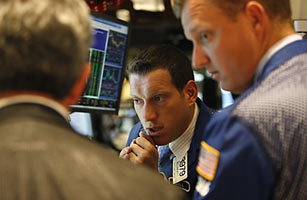Why Goldman Sachs Is Bullish, Sort Of
 Courtesy of TIME
Courtesy of TIME
It’s a bit odd these days that some of the most bullish things driving stock prices are not facts but opinions. Earlier in July there was a nice market bounce thanks to bullish comments by long bearish analyst Meredith Whitney. On Monday it was an opinion coming from the investment strategy team at Goldman Sachs, which reported that the firm was raising its estimate for what companies in the S&P 500 would earn this year and next.
Goldman’s strategists raised their expectation for 2009 earnings by 30%, and they hiked the 2010 outlook by 19%. With that boost, the 2010 earnings for S&P 500 companies should be 45% higher than 2009, Goldman says. Those hefty upward revisions, which sent investors on a buying spree, didn’t come because consumers are suddenly spending more, nor because housing is bouncing back, neither of which Goldman asserts. The lion’s share of Goldman’s new optimism derives from the fact that banks look more profitable now than they did several months ago. (Read "How to Know When the Economy Is Turning Up.")
Banks are seeing some light in their trading operations—Goldman Sachs is a star performer in that category—there’s more mortgage refinancing happening, and credit card problems may be bottoming, all good stuff, say Goldman’s strategists. But there’s another important reason the earnings for S&P financial stocks are looking better— many of the sickies are gone from the index, including Lehman Brothers, Fannie Mae and Freddie Mac.
It’s not just the banking stock group that benefits by offloading its weaklings. A stock sector known an ‘Consumer Discretionary,’ which includes everything from automakers to fast-food retailers, is enjoying a more bullish earnings outlook too, thanks— you guessed it— to the dropping of GM stock, which had been a load of lead to this sector’s profitability. As a result of offloading GM, earnings for the group are expected to rise by 35% in 2009 and 40% in 2010.
Investors may respond with huge cheers to the new earnings forecasts, but Goldman Sachs is not so ebullient. In fact, the firm goes to great lengths to point out the distortions to its growth projections, and adds that without the GM affect the consumer-discretionary stock group would see a far more modest 17% growth next year—not bad, but no blowout.
The other sobering note in Goldman’s bullish report today is the clearly stated anxiety over next year’s economy. "Although our current economic outlook is for below-trend growth thru 2010, the risk of a "’double-dip’ recession remains significant," the report notes. That said, Goldman Sachs raised its year-end price target for the stock market by 13%, sending a strong message to institutional investors not to sit on their hands, even in the face of major uncertainties. Among the stock groups Goldman favors: energy, basic materials, financials and technology.


